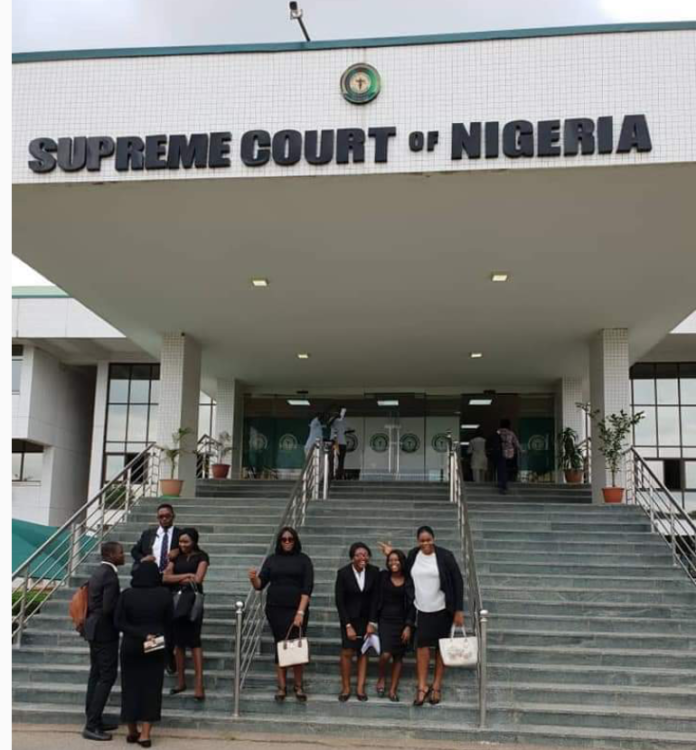The Supreme Court of Nigeria has directed that a copy of its judgment on the extent to which Governors and Houses of Assembly can exercise authority over local government councils should be sent to all Houses of Assembly in the country.
The Supreme Court gave the directive after her five man panel in a unanimous judgment banned the appointment of ‘transition committees’ for local government councils by state governors.
The panel led by Justice Olubolade Joe in a judgment delivered on 11th December 2019 stripped state governors of power to sack elected local government chairmen and councillors.
After the judgment, the Justice Olubolade Joe-led panel directed that a copy of the judgement should be served to all 36 State Houses of Assembly and the Minister of FCT on or before the December 30, 2019, Daily Trust reports.
The Supreme Court ruled that henceforth ‘the act giving legislative powers to state assembly members to undertake the process of sacking elected local government chairmen is null and void’.
The panel of justices unanimously declared that only the legislative arm of a local government council is empowered with the residual constitutional backing to sack council chairmen that maybe found blameworthy of any gross misconduct or violations of rules guiding public service.
This judgment was sequel to an appeal filed by 16 Ekiti state local government chairmen who were elected during Ayodele Fayose’s tenure as Ekiti state Governor and were sacked by the incumbent Governor Kayode Fayemi of Ekiti state.
The Supreme Court, in faulting the law purportedly relied on by Fayemi, held that Section 23(b) of the Ekiti State Local Government Administration (Amendment) Law, 2001, which empowered the governor to dissolve local government councils, whose tenure was yet to expire, violated section 7(1) of the Constitution from which the state House of Assembly derived the power to enact the local government law. Justice Centus Nweze, in the lead judgment, said: “There can be no doubt, as argued by the appellants’ counsel, that the Ekiti State House of Assembly is empowered to make laws of Ekiti State.
“However, the snag here is that, in enacting section 23(b) of the Ekiti State Local Government Administration (Amendment) Law, 2001, which empowered the first appellant to bridge the tenure of office of the respondents, it overreached itself. “In other words, section 23(b) (supra) is violative of, and in conflict with section 7(1) of the Constitution (supra). “Hence, it is bound to suffer the fate of ll laws which are in conflict with the Constitution, section 1(3) thereof.”
The judge Said Section 7(1) of the Constitution seeks to guarantee “the system of local government by democratically-elected local government councils and conferred “sacrosanctity on the elections of such officials whose electoral mandates derived from the will of the people freely exercised through the democratic process”.
“The implication, therefore, is that section 23(b) of the Ekiti State Local Government Administration (Amendment) Law, 2001, which was not intended to ‘ensure the existence of’ such democratically-elected councils, but to snap their continued existence by their substitution with caretaker councils, was enacted in clear breach of the supreme provisions of section 7(1) of the Constitution.
“To that extent, it (section 23(b) supra) cannot co-habit with section 7(1) of the Constitution (supra) and must, in consequence, be invalidated. “The reason is simple. By his oath of office, the governor swore to protect and not to supplant the Constitution.
“Hence, any action of his which has the capacity of undermining the same Constitution (as in the instant case where the first appellant, ‘Governor of Ekiti State and others’ dissolved the tenure of the respondents and replaced them with caretaker committees) is tantamount to executive recklessness which would not be condoned,” the judge said.
The court said the the tenure of the local government councils could not be abridged without violating the supreme constitutional provisions.
“Simply put, therefore, the election of such officials into their offices and their tenure are clothed with constitutional force. They cannot, therefore, be abridged without breaching the Constitution from which they derive their force. “The only permissible exception, where a state governor could truncate the lifespan of a local government council which evolved through the democratic process of elections, is ‘for overriding public interest’ in a period of emergency.”
















